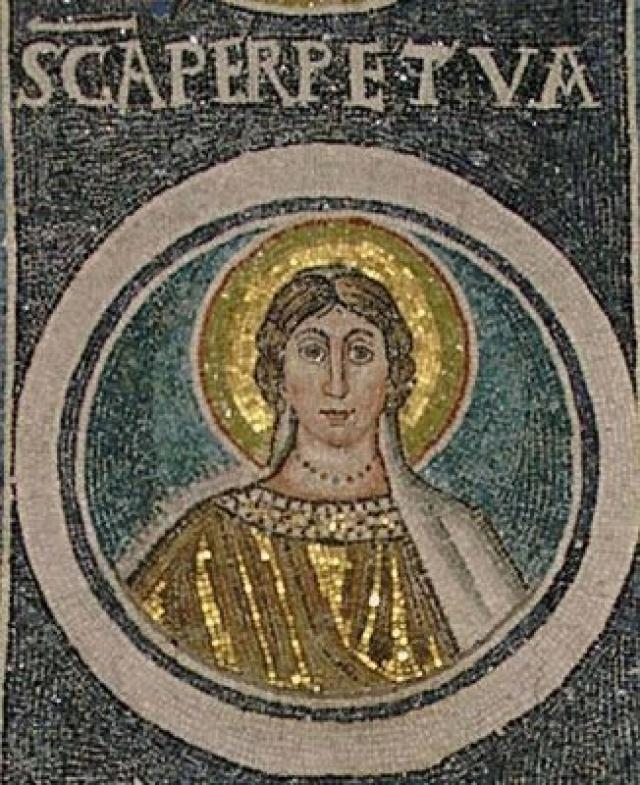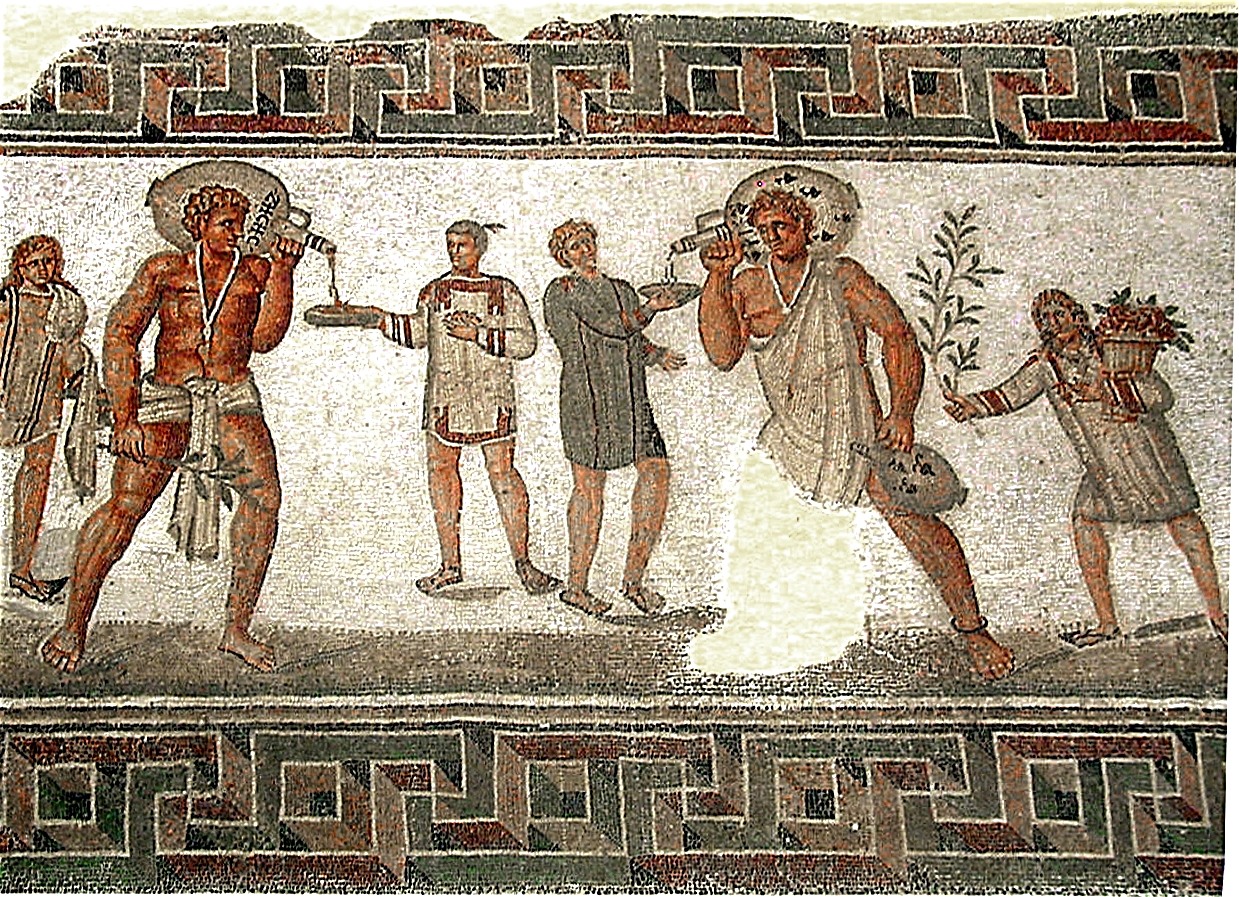|
Perpetua And Felicitas
Perpetua and Felicity ( la, Perpetua et Felicitas) were Christian martyrs of the 3rd century. Vibia Perpetua was a recently married, well-educated noblewoman, said to have been 22 years old at the time of her death, and mother of an infant son she was nursing. Felicity, an enslaved woman imprisoned with her and pregnant at the time, was martyred with her. They were put to death along with others at Carthage in the area of Africa in the Roman province of Africa (now known as Tunisia). ''The Passion of Perpetua and Felicity'' narrates their death. According to the passion narrative, five people were arrested and executed at the military games in celebration of the Emperor Septimius Severus's birthday. Along with Felicitas and Perpetua, these included two free men, Saturninus and Secundulus, and an enslaved man named Revocatus; all were catechumens or Christians being instructed in the faith but not yet baptized. To this group of five was added a further man named Saturus, who vol ... [...More Info...] [...Related Items...] OR: [Wikipedia] [Google] [Baidu] |
Saint
In religious belief, a saint is a person who is recognized as having an exceptional degree of Q-D-Š, holiness, likeness, or closeness to God. However, the use of the term ''saint'' depends on the context and Christian denomination, denomination. In Catholic Church, Catholic, Eastern Orthodox Church, Eastern Orthodox, Anglican Communion, Anglican, Oriental Orthodox, and Lutheranism, Lutheran doctrine, all of their faithful deceased in Heaven are considered to be saints, but some are considered worthy of greater honor or emulation. Official ecclesiastical recognition, and consequently a public cult of veneration, is conferred on some denominational saints through the process of canonization in the Catholic Church or glorification in the Eastern Orthodox Church after their approval. While the English word ''saint'' originated in Christianity, History of religion, historians of religion tend to use the appellation "in a more general way to refer to the state of special holiness t ... [...More Info...] [...Related Items...] OR: [Wikipedia] [Google] [Baidu] |
Pre-congregation
In the Catholic Church, the Dicastery for the Causes of Saints, previously named the Congregation for the Causes of Saints (), is the dicastery of the Roman Curia that oversees the complex process that leads to the canonization of saints, passing through the steps of a declaration of "heroic virtues" and beatification. After preparing a case, including the approval of miracles, the case is presented to the pope, who decides whether or not to proceed with beatification or canonization. History The predecessor of the congregation was the Sacred Congregation for Rites, founded by Pope Sixtus V on 22 January 1588 in the bull '' Immensa Aeterni Dei''. The congregation dealt both with regulating divine worship and the causes of saints. On 8 May 1969, Pope Paul VI issued the Apostolic Constitution ''Sacra Rituum Congregatio'', dividing it into two congregations, the Congregation for the Divine Worship and one for the causes of saints. The latter was given three offices, those of th ... [...More Info...] [...Related Items...] OR: [Wikipedia] [Google] [Baidu] |
Septimius Severus
Lucius Septimius Severus (; 11 April 145 – 4 February 211) was Roman emperor from 193 to 211. He was born in Leptis Magna (present-day Al-Khums, Libya) in the Roman province of Africa (Roman province), Africa. As a young man he advanced through cursus honorum, the customary succession of offices under the reigns of Marcus Aurelius and Commodus. Severus seized power after the death of the emperor Pertinax in 193 during the Year of the Five Emperors. After deposing and killing the incumbent emperor Didius Julianus, Severus fought his rival claimants, the Roman generals Pescennius Niger and Clodius Albinus. Niger was defeated in 194 at the Battle of Issus (194), Battle of Issus in Roman Cilicia, Cilicia. Later that year Severus waged a short punitive campaign beyond the eastern frontier, annexing the Osroene, Kingdom of Osroene as a new province. Severus defeated Albinus three years later at the Battle of Lugdunum in Roman Gaul, Gaul. Following the consolidation of his rule over ... [...More Info...] [...Related Items...] OR: [Wikipedia] [Google] [Baidu] |
The Passion Of Perpetua And Felicity
''The Passion of Saints Perpetua and Felicity'' ( la, Passio sanctarum Perpetuae et Felicitatis) is a diary by Vibia Perpetua describing her imprisonment as a Christian in 203, completed after her death by a redactor. It is one of the oldest and most notable early Christian texts. Along with the experiences of Perpetua and Felicity, the text also appears to contain, in his own words, the accounts of the visions of Saturus, another Christian martyred with Perpetua. An editor who states he was an eyewitness has added accounts of the martyrs' suffering and deaths. It survives in both Latin and Greek forms. Text and content Summary of the Passion text The traditional view has been that Perpetua, Felicity and the others were martyred owing to a decree of Roman emperor Septimius Severus (193–211). This is based on a reference to a decree Severus is said to have issued forbidding conversions to Judaism and Christianity, but this decree is known only from one source, the Augustan Hi ... [...More Info...] [...Related Items...] OR: [Wikipedia] [Google] [Baidu] |
Tunisia
) , image_map = Tunisia location (orthographic projection).svg , map_caption = Location of Tunisia in northern Africa , image_map2 = , capital = Tunis , largest_city = capital , coordinates = , official_languages = Arabic Translation by the University of Bern: "Tunisia is a free State, independent and sovereign; its religion is the Islam, its language is Arabic, and its form is the Republic." , religion = , languages_type = Spoken languages , languages = Minority Dialects : Jerba Berber (Chelha) Matmata Berber Judeo-Tunisian Arabic (UNESCO CR) , languages2_type = Foreign languages , languages2 = , ethnic_groups = * 98% Arab * 2% Other , demonym = Tunisian , government_type = Unitary presidential republic , leader_title1 = President , leader_name1 = Kais Saied , leader_ti ... [...More Info...] [...Related Items...] OR: [Wikipedia] [Google] [Baidu] |
Africa (province)
Africa Proconsularis was a Roman province on the northern African coast that was established in 146 BC following the defeat of Carthage in the Third Punic War. It roughly comprised the territory of present-day Tunisia, the northeast of Algeria, and the coast of western Libya along the Gulf of Sirte. The territory was originally inhabited by Berber people, known in Latin as ''Mauri'' indigenous to all of North Africa west of Egypt; in the 9th century BC, Phoenicians built settlements along the Mediterranean Sea to facilitate shipping, of which Carthage rose to dominance in the 8th century BC until its conquest by the Roman Republic. It was one of the wealthiest provinces in the western part of the Roman Empire, second only to Italy. Apart from the city of Carthage, other large settlements in the province were Hadrumetum (modern Sousse, Tunisia), capital of Byzacena, and Hippo Regius (modern Annaba, Algeria). History Rome's first province in northern Africa was established by ... [...More Info...] [...Related Items...] OR: [Wikipedia] [Google] [Baidu] |
Slavery In Ancient Rome
Slavery in ancient Rome played an important role in society and the economy. Besides manual labour, slaves performed many domestic services and might be employed at highly skilled jobs and professions. Accountants and physicians were often slaves. Slaves of Greek origin in particular might be highly educated. Unskilled slaves, or those sentenced to slavery as punishment, worked on farms, in mines, and at mills. Slaves were considered property under Roman law and had no legal personhood. Most slaves would never be freed. Unlike Roman citizens, they could be subjected to corporal punishment, sexual exploitation (prostitutes were often slaves), torture and summary execution. Over time, however, slaves gained increased legal protection, including the right to file complaints against their masters. One major source of slaves had been Roman military expansion during the Republic. The use of former enemy soldiers as slaves led perhaps inevitably to a series of ''en masse'' armed rebel ... [...More Info...] [...Related Items...] OR: [Wikipedia] [Google] [Baidu] |
Nobility
Nobility is a social class found in many societies that have an aristocracy (class), aristocracy. It is normally ranked immediately below Royal family, royalty. Nobility has often been an Estates of the realm, estate of the realm with many exclusive functions and characteristics. The characteristics associated with nobility may constitute substantial advantages over or relative to non-nobles or simply formal functions (e.g., Order of precedence, precedence), and vary by country and by era. Membership in the nobility, including rights and responsibilities, is typically Hereditary title, hereditary and Patrilinearity, patrilineal. Membership in the nobility has historically been granted by a monarch or government, and acquisition of sufficient power, wealth, ownerships, or royal favour has occasionally enabled commoners to ascend into the nobility. There are often a variety of ranks within the noble class. Legal recognition of nobility has been much more common in monarchies, ... [...More Info...] [...Related Items...] OR: [Wikipedia] [Google] [Baidu] |
Christian Martyrs
In Christianity, a martyr is a person considered to have died because of their testimony for Jesus or faith in Jesus. In years of the early church, stories depict this often occurring through death by sawing, stoning, crucifixion, burning at the stake or other forms of torture and capital punishment. The word ''martyr'' comes from the Koine word μάρτυς, ''mártys'', which means "witness" or "testimony". At first, the term applied to Apostles. Once Christians started to undergo persecution, the term came to be applied to those who suffered hardships for their faith. Finally, it was restricted to those who had been killed for their faith. The early Christian period before Constantine I was the "Age of Martyrs". "Early Christians venerated martyrs as powerful intercessors, and their utterances were treasured as inspired by the Holy Spirit." In western Christian art, martyrs are often shown holding a palm frond as an attribute, representing the victory of spirit over fle ... [...More Info...] [...Related Items...] OR: [Wikipedia] [Google] [Baidu] |
Catalunya
Catalonia (; ca, Catalunya ; Aranese Occitan: ''Catalonha'' ; es, Cataluña ) is an autonomous community of Spain, designated as a ''nationality'' by its Statute of Autonomy. Most of the territory (except the Val d'Aran) lies on the northeast of the Iberian Peninsula, to the south of the Pyrenees mountain range. Catalonia is administratively divided into four provinces: Barcelona, Girona, Lleida, and Tarragona. The capital and largest city, Barcelona is the second-most populated municipality in Spain and the fifth-most populous urban area in the European Union. > > > ''Catalonia'' theoretically derived. During the Middle Ages, Byzantine Empire, Byzantine chroniclers claimed that ''Catalania'' derives from the local medley of Goths with Alans, initially constituting a ''Goth-Alania''. Other theories suggest: *''Catalunya'' derives from the term "land of castles", having evolved from the term ''castlà'' or ''castlan'', the medieval term for a castellan (a ruler of a cast ... [...More Info...] [...Related Items...] OR: [Wikipedia] [Google] [Baidu] |
Butcher
A butcher is a person who may Animal slaughter, slaughter animals, dress their flesh, sell their meat, or participate within any combination of these three tasks. They may prepare standard cuts of meat and poultry for sale in retail or wholesale food establishments. A butcher may be employed by supermarkets, grocery stores, butcher shops and fish markets, slaughter houses, or may be Self-employment, self-employed. Butchery is an ancient trade, whose duties may date back to the domestication of livestock; its practitioners formed guilds in England as far back as 1272. Since the 20th century, many countries and local jurisdictions offer Professional certification, trade certifications for butchers in order to ensure quality, safety, and health standards but not all butchers have formal certification or training. Trade qualification in English-speaking countries is often earned through an apprenticeship although some training organisations also certify their students. In Canada, on ... [...More Info...] [...Related Items...] OR: [Wikipedia] [Google] [Baidu] |







.jpg)

